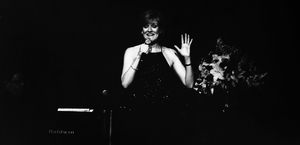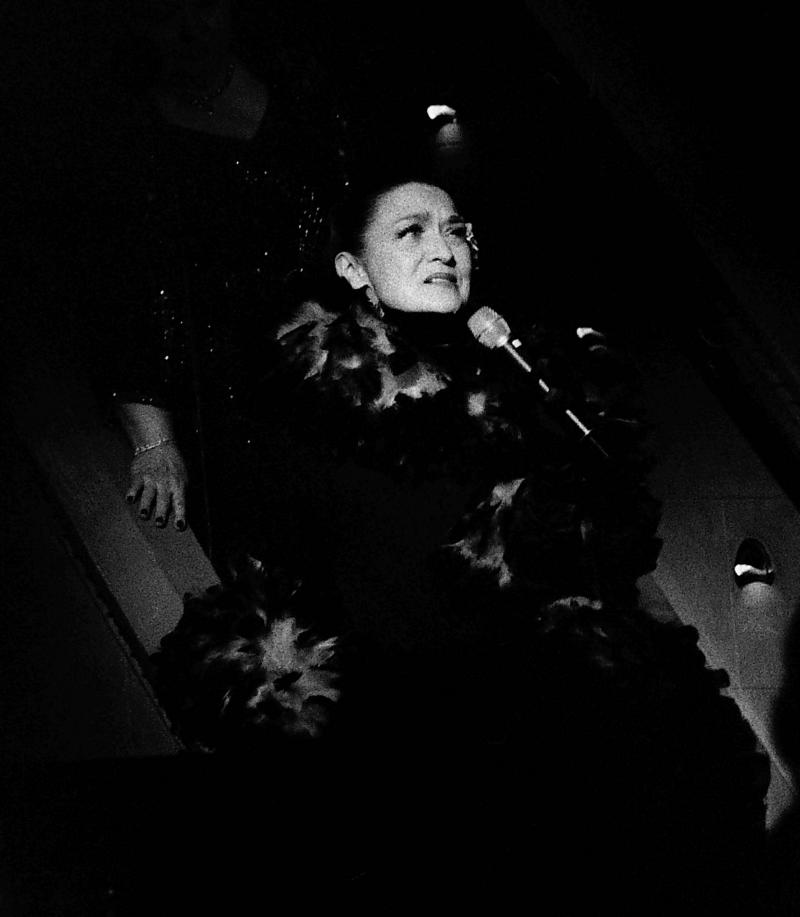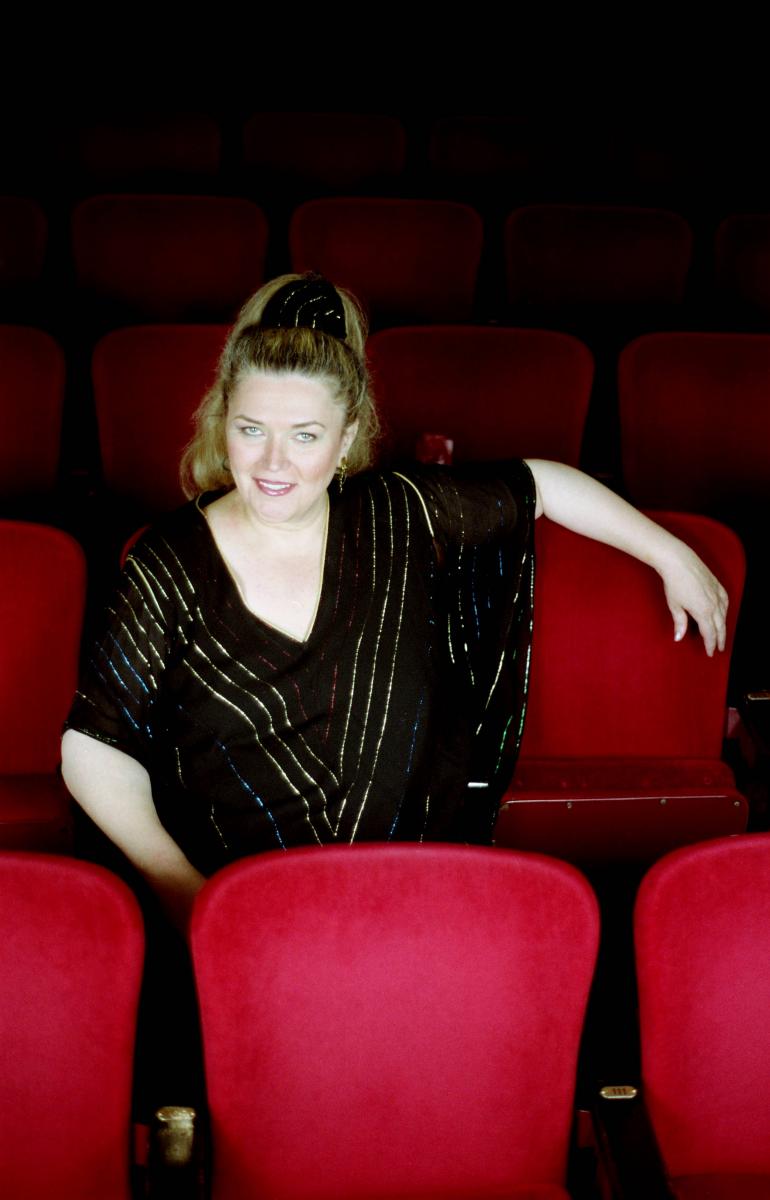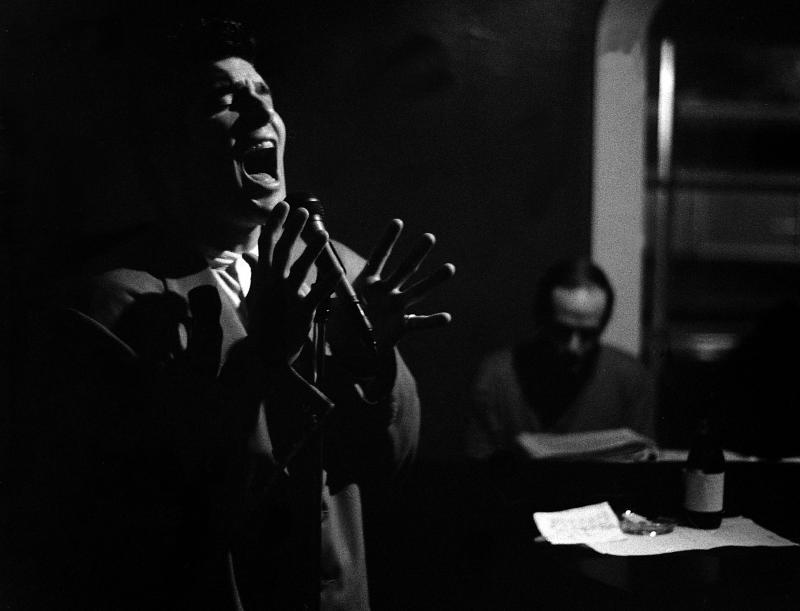Feature: WHY CABARET?

"I hate cabaret." That was my best friend, a rock and roll singer-songwriter. "I swear I don't know how you do it, sitting in clubs night after night, listening to people sing other peoples' songs. I mean, isn't it boring? What's the point of singing something you didn't even write yourself? It's not even a personal journey."
Oh, but it is an incredibly personal journey. It is personal for the singer and for the audience.
There are many who feel the same way as my rocker friend. In the days of the original American Idol judges of the show could often be seen to sneer and tell a singer that their performance was "too Broadway" or "too cabaret." It was an offensive and derogatory diminishment of an art form clearly not understood by the people upon whose face that sneer could be found. That's ok. They don't get it. Their frame of reference is narrow, so their lack of understanding can be forgiven. A lot of people do get it, and more people are investigating nightclub performing and becoming hooked all the time... because it is an authentic art form all its own and it is time for people to stop saying that cabaret is dying.
Because it's not.
 By definition, cabaret is any entertainment performed where food and drink are served. Whether a person is sitting in a theater watching a cabaret show or a nightclub listening to a lounge singer, they are enjoying the art of cabaret. Open mic nights, magic shows, burlesques, drag brunches, ventriloquist and comedy acts, storytellers, or a piano bar where Sheree Sano plays or Nicolas King croons - these are all cabaret acts. And why do people go? Why do people want to spend their nights in these rooms, listening to performers famous or humble sing songs they didn't write? Because there is a story to tell.
By definition, cabaret is any entertainment performed where food and drink are served. Whether a person is sitting in a theater watching a cabaret show or a nightclub listening to a lounge singer, they are enjoying the art of cabaret. Open mic nights, magic shows, burlesques, drag brunches, ventriloquist and comedy acts, storytellers, or a piano bar where Sheree Sano plays or Nicolas King croons - these are all cabaret acts. And why do people go? Why do people want to spend their nights in these rooms, listening to performers famous or humble sing songs they didn't write? Because there is a story to tell.
Storytelling is an essential part of the human experience. It is by sharing our stories that we see inside of each other and by hearing our stories that we see inside of ourselves. With rare exception, everyone wants to tell a story.
But not everyone is a writer. Some people are, and some cabaret acts feature original material written by the performers, and that's marvelous, but it isn't a widespread custom.
Many is the person with a gift for singing, with a knack for performing. There are actors with a deep well of understanding for humanity and for the emotions that people feel. Some actors hear a monologue from the play Time Stands Still or perhaps Burn This and their hearts begin to race, maybe their breathing grows shallow, as the emotions bubble up inside of them. They understand this speech, they see this character, they feel the character's wants and their needs and they have to say these words. Have to. It is a testament to the playwright who wrote the words that so many artists of the Thespianic persuasion wish to recite the words, year in and out, and the artists are so grateful to the authors for giving them words to say, emotions to express, stories to tell. This is the same thing that happens when a singer hears a song that speaks to them so strongly that it might, well, have been written for them. That musical storyteller wants more than to just sing the song in their living room, but recording CDs is expensive, so that's not quite the option. They could go to a friend's house and sing it at their piano, but if a storyteller tells a story in the woods and there is no audience to hear the story, are they going to sleep the sleep of the satisfied? These are the people in the cabaret rooms, piecing together a journey that parallels their life experience, using the musical writings of other people to illuminate their lessons learned. That doesn't mean they didn't sit down and write something, that isn't to say that they didn't craft a journey to be told to the people sitting in the seats, ready to hear their tale. Inasmuch as there are productions happening all over the world all year that allow an actress to recite the Jonquil speech or an actor to ponder the suffering of slings and arrows, there are singers with a desire to expound on the old devil moon in your eyes and posit that rain comes from the earth and hummingbirds do fly. These artists deserve their opportunity to live inside of these musical monologues, and their audiences deserve the chance to see their favorites brought to life.
Have you ever been at a wedding when that song comes on? Say, for instance, you're at the wedding chatting with someone over an after-dinner drink and "Moonglow" comes on. It's your favorite song. You sigh. You take the hand of the person with whom you are engaged in the art of social intercourse and you lead them to the dance floor to dance to this most splendid melody that means so much to you. That's what happens to the people in the audience during a club act, and it's a different song for each person, so out of 14 musical selections in one cabaret show, there are an infinite number of possibilities for patrons of the club to sigh and take the hand of the person beside them because Leslie Orofino is singing "Where Am I Going?", or to chair dance because Marnie Klarr is singing "Ode to Billy Joe." A singer doesn't have to be famous to move an audience. Oftentimes the most famous singers play venues that are so big that it would be impossible to make anyone past the second row feel anything. In these small intimate clubs, Gerrilyn Sohn can look right into your eyes while singing "Send in the Clowns," an experience not to be had at Madison Square Garden. The burlesque shows and drag shows permit the actors to leave the stage and interact with the patrons, making for an evening of theater their clientele won't soon forget.
And what of the people sitting in the seats? Why, one might ask, would someone go to see a show being sung by a singer who isn't famous, performing songs they didn't write? What possible use could those members of society have for cabaret theater? People like live music and they don't care for the ticket prices and crowds in the larger venues. People like the one-on-one connection they get from being in those smaller rooms. There is a saying applied to relationships about every pot having a lid - that expression can be easily focused in the direction of the cabaret and nightclub scene. 2019 was a year in which the artistry of Judy Garland was proven to as relevant as ever. Judy Garland is, sadly, no longer alive; but all year long there were Judy Garland tribute shows in every club in the city. Those fans of the legend had many opportunities to go out and hear the music of their idol performed live. Every week there are tribute shows where devotees of Dolly, lovers of Liza, and fans of Frank can thrill to that music in a real-time setting, maybe sharing that music with a loved one or a new friend, or just having a cocktail and remembering the first time they heard that sound. The experience is not limited to the singers, either. Thanks to tribute shows, members of the club-going public who feel like they were born in the wrong era can hear Seth Sikes sing an entire evening of '20s tunes or see Carole J. Bufford perform a set of nothing but '60s songs. There are Cole Porter evenings for the aesthetes, Rodgers and Hammerstein shows for the romantics and Stephen Sondheim shows for the intellectuals - and they are frequently group shows where there is a chance of seeing a singer whose work one has come to admire, and a chance of discovering a new talent to follow, all the while enjoying songs that are already recognizable, melodies and lyrics that are old friends sent to wrap one up in a blanket of familiarity and comfort.
Let us now consider the position of the performers working in cabaret. Many of these artists are not only nightclub performers, they are actors. The ratio of jobs to actors is hardly an equitable one; what are these people to do when they haven't had the good fortune to be cast in a show? Many of them have day jobs, some of them teach, every one of them has a survival job so that they can invest in food and a roof. While they are working outside of their chosen profession, what is their artistic outlet to be? Or are they take the passion that they have had their entire lives, put it in a drawer and put it away? It would be so much easier to put together a club act, even though the amount of work is immense and the cost can be disheartening (Nancy LaMott used to say "cabaret is a very expensive hobby"). The artistic fulfillment to be gained by these actors from putting together these shows is immeasurable to them, with the happy byproduct of audiences satisfied by an opportunity to see, live, a musician whose work feeds their interests - and there are other interests that are nurtured in other ways.
It was in a cabaret/concert setting that Jeremy Jordan first sang "She Used to Be Mine" from the play "Waitress." Since there is no chance, at all, that he will ever play Jenna, this (fast becoming) legendary performance is, quite literally, the result of the freedom provided by the cabaret art form. Within the last year, this writer saw Liz Callaway speak of how, in her youth, she wanted to play Cassie in A Chorus Line, but that she was never a dancer; then Liz Callaway sang "The Music And The Mirror." Where else but in a cabaret/concert setting could a person with the fantasy of hearing the Callaway voice sing that iconic song happen? Donna McKechnie still sings "The Music and The Mirror" in her club act. There is little chance of audiences ever getting to see Ms. McKechnie play Cassie again, but for those few minutes in her show, they can. Andrea McArdle and Beth Leavel have both played Mama Rose in regional theater. Unless a person lived in the city where those shows were produced or bought a plane ticket to go see those productions, the only way of experiencing the thrill of seeing two iconic Broadway actresses play that legendary role is a potential Youtube video of a bootleg. Yet, in their shows, audiences can at least hear, live, what their Mama Rose was like, as they sing one of Rose's songs from Gypsy. The same can be said of seeing Norm Lewis sing "Trouble" and finding out first hand what his performance in "The Music Man" was like.
The women of musical theater, especially, benefit from the art form of cabaret because of show business double standards. A man can play Harold Hill and Sweeney Todd at any age, while women seem to have some sell-by date stamped on their foreheads, restricting their opportunities to work. In nightclubs, age disappears, and the women of the industry can sing any song, be any character, do anything that they like - including ply their craft while waiting for the next time some producer deigns to give them a job. It's an unfair situation for the women of the industry, women who deserve to work and who have audiences that deserve to see their artistry. Cabaret and club acts give these actresses an opportunity to control their destiny.
Cabaret and club acts can give any performer an opportunity to control their destiny, regardless of their race, gender, degree of fame, because anybody wishing to can create their own act. It isn't easy. It takes a lot of work, it takes investment of time and money, and there's a ton of self-promotion that has to be done to get those butts in the seats. A cabaret artist has to be passionate, smart and tenacious; but the reward can be vast, and not just for them, for the audiences who will devote themselves to the particular brand of magic that they, the artists, are creating. It's not a dying art, and it isn't something that people should hate, even though there are those who do, sadly, say that they hate cabaret. Then again, there are people who hate sports, and it doesn't stop the fans from enjoying the game, whatever that game may be. Cabaret, like many things, is there for the taking, and it's there for the making. People just have to accept that it isn't going anywhere and, maybe, test the waters of cabaret to see how it has evolved and what the art form looks like in 2020.
From where this guy is sitting, it's looking pretty damn good.
Julie Wilson, Baby Jane Dexter, David Campbell, Rich Affannato, Nancy LaMott and Karen Mason
Play Broadway Games
Videos





%20(1024%20×%20512%20px).png)